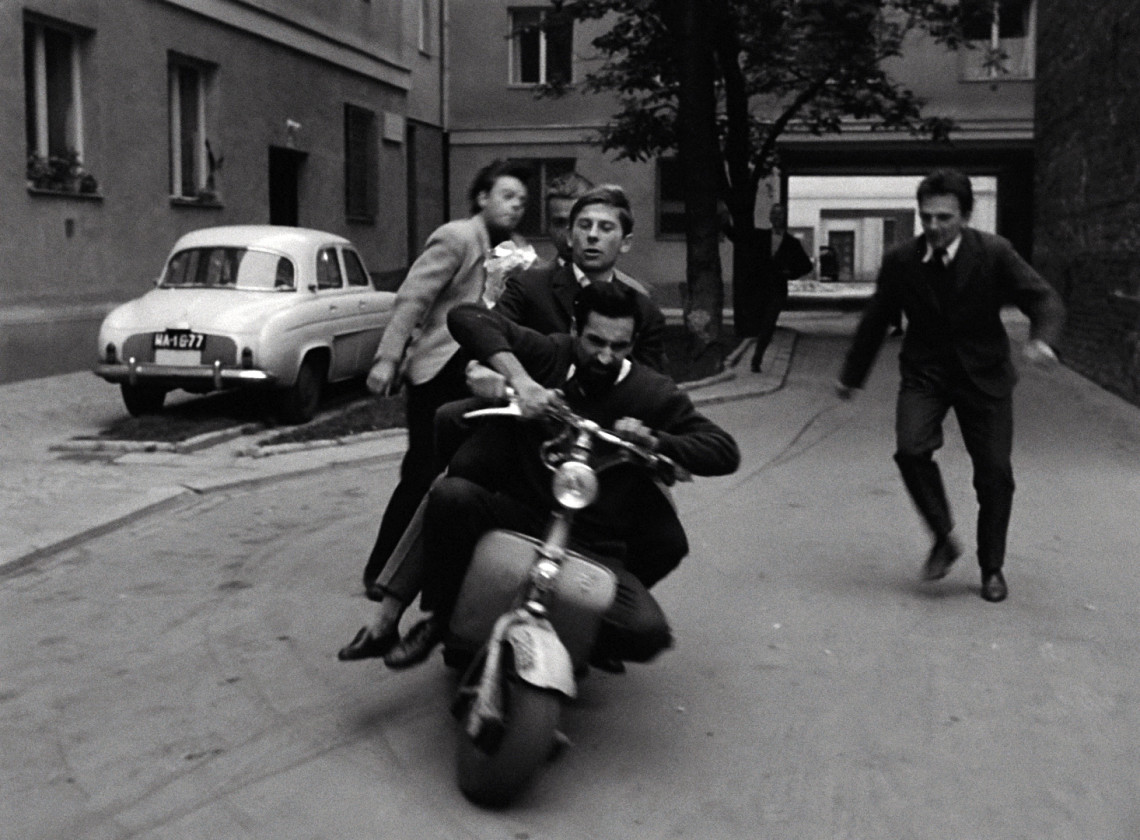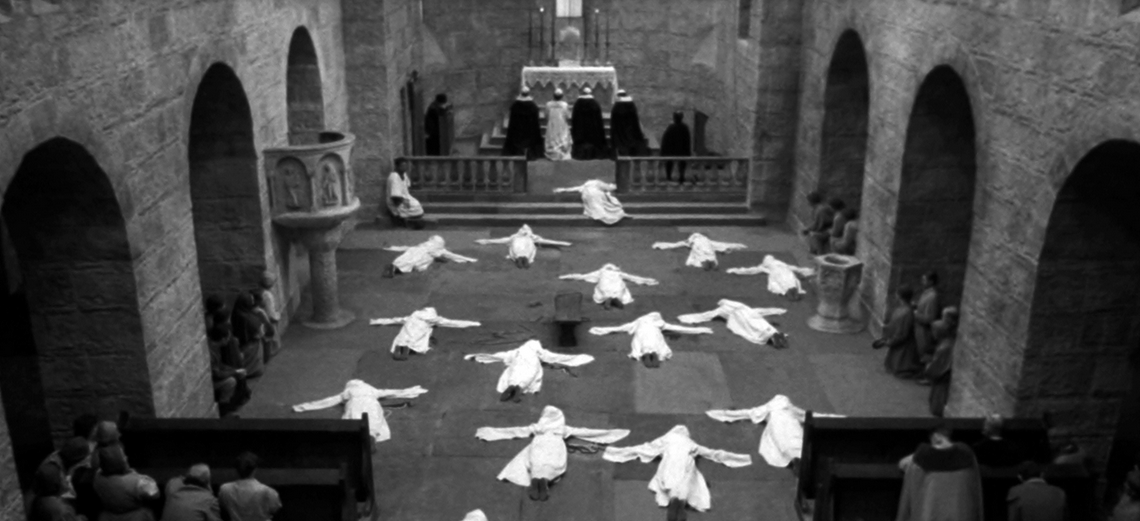Poland’s film production of the 1950s and the early 1960s, known as the Polish School, offers a rich array of cinematic approaches—from understated existentialist meditations on loneliness to swanky noir, with touches of Hitchcock and melodrama. A number of these black-and-white gems are part of the “Martin Scorsese Presents: Masterpieces of Polish Cinema“, scheduled to tour the United States beginning this month.
Andrzej Wajda’s Canal (1957), though not in the series, was emblematic of the School, and a precursor to Wajda’s other early masterpiece—on view—Ashes and Diamonds (1958), based on the eponymous novel by Jerzy Andrzejewski. Where Canal dealt with the topic of the Home Army resistance fighters, depicted in Wajda’s film as they descend and perish in the city’s sewer system in the Uprising of 1944, Ashes and Diamonds focuses not on the heroically dying but on the conflicted survivors. Immediately post-war, the Home Army soldiers, such as the film’s protagonist, Maciek (Zbigniew Cybulski), face dangerous circumstances: Opposed to the Stalinist takeover of Poland, they are hunted down by the secret police, while carrying out offensive actions against the Communists.
Wajda’s style in this early phase is inflected with emotional, romantic undertones: Maciek falls in love with a pretty hotel bartender, and finds himself yearning for a life without killing. Torn between duty and love, he cannot find a way out. The final sequence in the film shows him haplessly shooting a communist functionary, and then trying to leave town as he stumbles into an army patrol, and is shot. Wounded, Maciek drags himself along the city walls and then dies a terrible, agonizing death among the city’s rubble. His animal-like, spasmodic death throes reduce Maciek to a cruel biological state, emphasizing the injustice of a young life saved from the abyss of war, only to be mercilessly sacrificed to a political reshuffle.
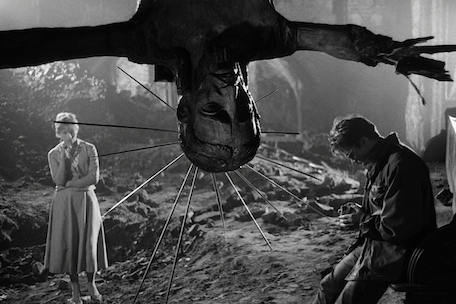 The role of Maciek marked Zbigniew Cybulski’s career. Likened to the American James Dean, in his roles he was seen as the quintessential representative of the “lost” generation: Cynical on the surface, yet conflicted and vulnerable, unable to find his place in the reconstructed Poland.
The role of Maciek marked Zbigniew Cybulski’s career. Likened to the American James Dean, in his roles he was seen as the quintessential representative of the “lost” generation: Cynical on the surface, yet conflicted and vulnerable, unable to find his place in the reconstructed Poland.
Cybulski’s tragic death on a film set at the height of his career, as he jumped off from a speeding train—a stunt he executed repeatedly, including in his cameo role in Jerzy Kawalerowicz’s Night Train and in Tadeusz Konwicki’s Jump (both on view)—solidified his status as Poland’s doomed rebel. Wajda himself showed ambivalence towards Poland’s new social order: A counterweight to Maciek in Ashes in Diamonds is a power-hungry young apparatchik, Drewnowski (Bogumił Kobiela).
A member of the working class, Drewnowski has risen up through the communist hierarchy, but his eagerness and greed get the best of him, and an important political dinner finds him drunk and compromised. He then turns to his other masters, the Home Army, only to be declared a traitor. Thus neither Drewnowski nor Maciek manages to fulfill their plans for a better life, and both meet a degrading end.
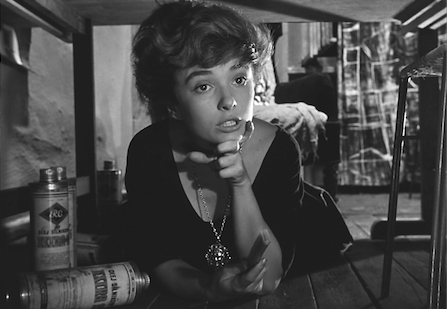 Wajda continued his concerns with the post-war dilemmas in Innocent Sorcerers (1960), starring one of Poland’s most renowned actors, Tadeusz Łomnicki, and with a screenplay by a younger Polish filmmaker, Jerzy Skolimowski, co-written with Jerzy Andrzejewski.
Wajda continued his concerns with the post-war dilemmas in Innocent Sorcerers (1960), starring one of Poland’s most renowned actors, Tadeusz Łomnicki, and with a screenplay by a younger Polish filmmaker, Jerzy Skolimowski, co-written with Jerzy Andrzejewski.
Where Wajda’s earlier Ashes and Diamonds dealt with the young men who experienced the war as soldiers, Innocent Sorcerers looks to the generation that would have spent its childhood under the occupation, and finds itself questioning old values and conventions in the wake of the war. Łomnicki plays Bazyli, a sports doctor, who moonlights as a jazz percussionist. Leading a dissolute life, Bazyli is content in his role as heartbreaker, but soon meets his match in Pelagia (Krystyna Stypulkowska), a petite, cheeky brunette. Pelagia challenges Bazyli to a game of coolly intellectual tit-for-tat, and the night finds them first wandering the streets, and then at Bazyli’s squalid bachelor pad.
While the romantic encounter betrays some inherent predictability—two unlikely individuals fall for each other—Innocent Sorcerers seduces with its jaunty, jazzy feel of the French New Wave. In the pair’s endless games, Wajda captures the mixture of both cunning and innocence that Bazyli and Pelagia display as they negotiate their relationship. The testing of the expectations of gender and of the limits of sexual freedom bring Wajda closer to his younger contemporaries, away from the more classical subjects of patriotism and sacrifice. The film’s thematic openness is partly thanks to the brief period of rejuvenation that Polish social life and arts underwent after the political thaw of 1956.
The more traditional themes of patriotism and honor are treated in Andrzej Munk’s Eroica (1958), set during the Second World War, but they undergo a radical subversion. Eroica is actually two films in one, and part of its stylistic daring lies in paring off two contrasting segments: a pastiche of patriotism, with a realist portrait of the daily heroism of Polish soldiers in a POV camp. In Part I, Scherzo Alla Pollaca, a unwilling hero, Babyface, finds himself carrying dangerous messages across army lines. Babyface bears strong resemblance to The Good Soldier Svejk, a novel by Jaroslav Hasek: a person with no discernible morality, in the Brechtian and Hasek vein, Babyface is more concerned with his carnal appetites than with military matters. Munk’s audacity lies in treating the war, a subject that would have still been considered sacred, as material for eviscerating pastiche. Part II, Ostinato Lugubre, softens Eroica’s impact somewhat, as it tells the story of Polish officers confined to the claustrophobic quarters of a POV camp, where bickering and obscure rules enliven the monotony of prison life. Against it, there lies the desperation of Żak (Józef Kostecki), a querulous loner who makes a run for freedom, and is gunned down by a German guard. Munk’s insistence on the mundane offsets Żak’s act, and undercuts the popular vision of idealized war heroes borrowed from Romanticism.
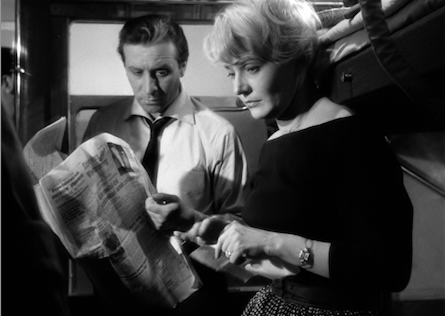 Though often indirectly, World War II haunts most of the films in the Polish School section of the Scorsese series—such as in the atmospheric coloring of Night Train (1959), by Jerzy Kawalerowicz, where a passenger cannot sleep on a train’s bunk beds because they remind him of Buchenwald, a German concentration camp. The film, whose action is largely confined to an overnight train ride, has often been categorized as a psychological thriller referencing Hitchcock. It is a story about appearances: As passengers board the train, the news breaks out that a man who has murdered his wife has escaped from the destination town. The news coincides with the boarding of a mysterious passenger wearing dark glasses and a trench coat, Jerzy (Leon Niemczyk). Jerzy wishes to travel in solitude, but has another passenger, Marta (Lucyna Winnicka) forced upon him. Both harbor secrets, and a play of innuendos and suspicion ensues. The plot culminates in the real killer being hunted down and tormented by the passengers. As police arrives, the crowd parts and stands silent, mortified at its own viciousness—a scene that in its early shots resembles the gruesome hunting down of a psychopath in Fritz Lang’s M. In the context of the war, this sequence serves as a powerful allusion to mob mentality at its most virulent, and to aggression as an acting out of latent traumas. To drive this message, Kawalerowicz has one actor run out of the train in hot pursuit still wearing pajamas, whose stripes resemble the outfits worn by prisoners in concentration camps.
Though often indirectly, World War II haunts most of the films in the Polish School section of the Scorsese series—such as in the atmospheric coloring of Night Train (1959), by Jerzy Kawalerowicz, where a passenger cannot sleep on a train’s bunk beds because they remind him of Buchenwald, a German concentration camp. The film, whose action is largely confined to an overnight train ride, has often been categorized as a psychological thriller referencing Hitchcock. It is a story about appearances: As passengers board the train, the news breaks out that a man who has murdered his wife has escaped from the destination town. The news coincides with the boarding of a mysterious passenger wearing dark glasses and a trench coat, Jerzy (Leon Niemczyk). Jerzy wishes to travel in solitude, but has another passenger, Marta (Lucyna Winnicka) forced upon him. Both harbor secrets, and a play of innuendos and suspicion ensues. The plot culminates in the real killer being hunted down and tormented by the passengers. As police arrives, the crowd parts and stands silent, mortified at its own viciousness—a scene that in its early shots resembles the gruesome hunting down of a psychopath in Fritz Lang’s M. In the context of the war, this sequence serves as a powerful allusion to mob mentality at its most virulent, and to aggression as an acting out of latent traumas. To drive this message, Kawalerowicz has one actor run out of the train in hot pursuit still wearing pajamas, whose stripes resemble the outfits worn by prisoners in concentration camps.
Night Train creates a rich microcosm of personalities, from Marta, a young woman in the grips of an unhappy passion, to a disenchanted wife (Teresa Szmigielówna) who seeks cheap sensational thrills, but is quick to condemn any human frailty. An even more narrowly circumscribed universe is depicted in Tadeusz Konwicki’s Last Day of Summer (1958), shot with barely any props, and whose action takes places during a single day on the Baltic coast. In the story, a mysterious young man (Jan Machulski), who remains unnamed, meets and courts an older woman (Irena Laskowska). The man’s fragility accentuates the eeriness of what could be an ordinary courtship. The woman reveals her past love affair, with a man whose whereabouts she lost during the war. Here then are two people who, like shipwrecks, attempt in vein to find meaning in life that has robbed them of illusions, and in the woman’s voice linger despair and refusal to start anew. The bare scenery of the white dunes, the foaming sea, plus the taut, disjointed dialogue, interrupted by long, heavy pauses, add to the mystery.
The abstract, symbolic dimension that marks Last Day of Summer is also powerfully realized in Jerzy Kawalerowicz’s Mother Joanna of the Angels (1960), a film whose religious subject matter may present the biggest challenge to contemporary viewers. A loose adaptation of events that took place in the French village of Loudun in the 17th century, the film tells a story of a nun, Mother Joanna (Lucyna Winnicka), who lives in a remote convent and is believed to be possessed. Kawalerowicz draws on his country’s rich pagan traditions to transport the story to Poland, and portrays the village inhabitants as governed by superstitions and belief in dark forces, which, to some extent, mirror their own salacious drives. A young priest, Józef (Mieczysław Voit) is summoned to exorcise Mother Joanna’s demons. The pair’s close encounters lead to a tense whipping ritual, where Mother Joanna and Father Józef mortify their flesh in a single room, separated by creaky clotheslines. Both tormented and sensual, the suggestive scene succeeds in drawing out the duality of the characters’ relationship, which is spiritual, and yet carnal.
Mother Joanna of the Angels was a contender for the Palm d’Or in Cannes, eventually to be beaten by Luis Buñuel’s Viridiana. Marked by the austere white gowns and headpieces, the richness and subtle gradations of the gray scale in fine cinematography by Jerzy Wójcik (who also worked on Wajda’s Ashes and Diamonds and on Munk’s Eroica), its beauty is undeniable. But what may be missing for the contemporary viewer is a real sense of Mother Joanna and Father Józef’s affection, which would have transposed the religious parable into a more psychologically complex film.
As it is, the most powerful scenes belong to the highly choreographed ensembles, in which the nuns writhe and babble, and to the heated exchange in which Mother Joanna confesses her contempt for mediocrity. Bewitched, she is, in a way, a symbol for the generation that emerged from the agony of war: Uncertain that the trust in God or in human goodness can save her, but also ambitious and hungry for life, and for recognition of her unique powers, she sets herself above the undistinguished masses. In both of his films, Kawalerowicz presents the human psyche as unknowable—a mystery that, in the Polish cinema would soon give way to less metaphysical considerations of individual vs. the state, a theme already discernible in Mother Joanna’s challenge to the status quo and to the Church’s hierarchy that thwarts her personal vision.
…
Note: The films are part of the Martin Scorsese Presents: Polish Masterpieces of Cinema retrospective, which premiers at the Film Society of Lincoln Center on February 5th, and will tour the United States throughout 2014. The films are being presented in digitally restored versions, thanks to the efforts of DI Factory.
All photos courtesy of Milestone Film & Video

















